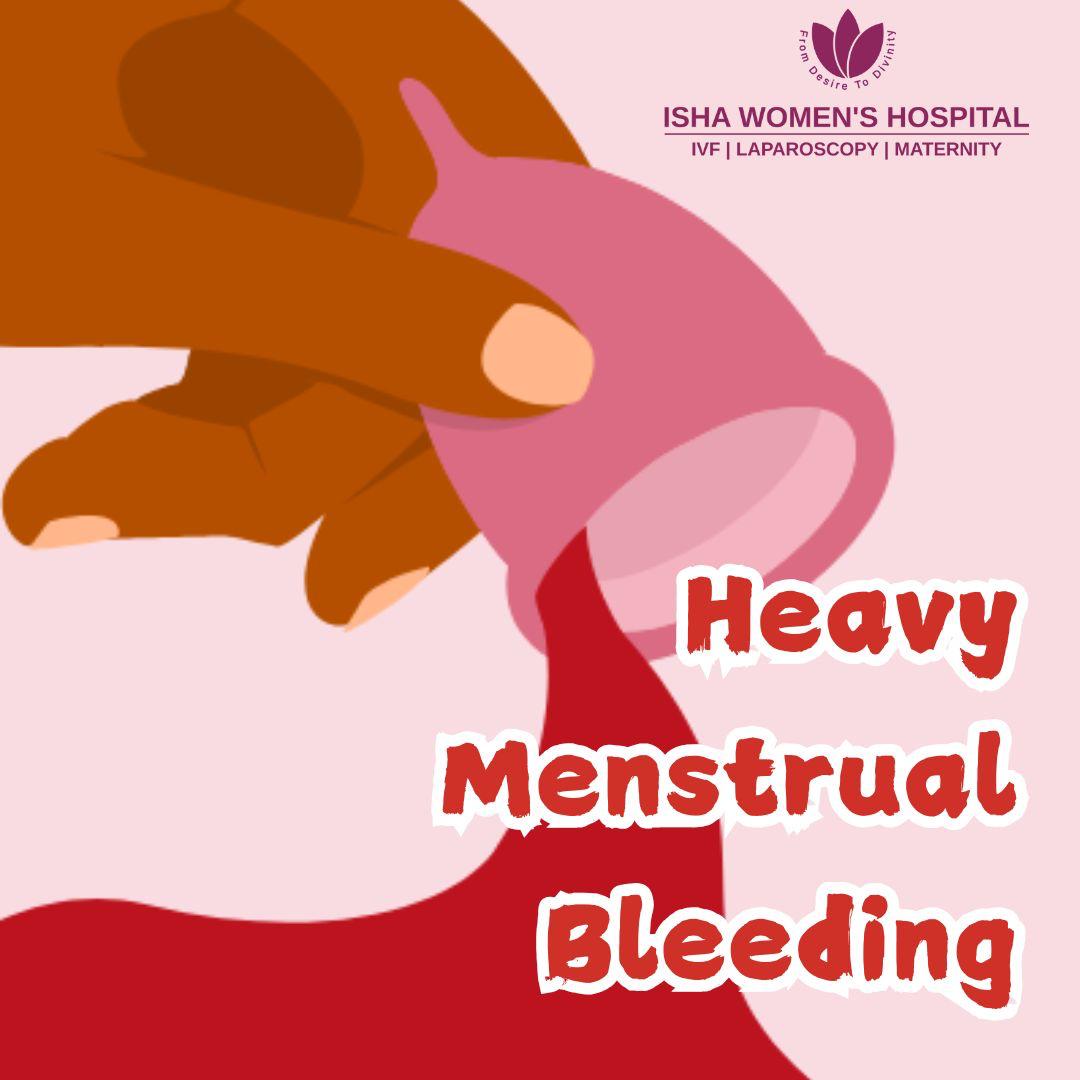Heavy Menstrual Bleeding: Causes and Fertility Implications

Understanding Heavy Menstrual Bleeding (Menorrhagia)
- Bleeding lasting more than 7 days
- Passing large blood clots
- Changing pads or tampons every 1–2 hours
- Severe cramping and fatigue
- Symptoms of anaemia (weakness, dizziness, pale skin)
If you experience these signs, it is crucial to seek medical evaluation. Isha Women’s Hospital, one of the best fertility centres provides cutting-edge diagnostic and treatment solutions to understand the causes of heavy bleeding
What Causes Heavy Menstrual Bleeding?
According to Dr Chinmay Pataki, one of the expert fertility specialists and gynaecologists in Mumbai, several factors can contribute to heavy menstrual bleeding (menorrhagia). These include:
1. Hormonal Imbalance
- Polycystic Ovary Syndrome (PCOS): Disrupts ovulation, leading to irregular and heavy periods.
- Thyroid Disorders: Both hypothyroidism and hyperthyroidism can affect menstrual flow, causing excessive bleeding.
- Perimenopause: Fluctuating estrogen levels during the transition to menopause can lead to unpredictable and heavy bleeding.
- Fibroids & Polyps: Noncancerous growths in the uterus can result in excessive or prolonged bleeding.
- Adenomyosis: A condition where the uterine lining grows into the muscular wall, leading to painful and heavy periods.
- Endometriosis: Tissue similar to the uterine lining develops outside the uterus, often causing abnormal bleeding and severe pain.
- Bleeding Disorders: Certain conditions affecting blood clotting can lead to prolonged menstrual bleeding.
- Medications: Blood thinners and certain drugs that interfere with clotting mechanisms may contribute to excessive menstrual flow.
How Does Heavy Menstrual Bleeding Affect Fertility?
- Ovulation Problems: Irregular or anovulatory cycles make conception difficult.
- Uterine Lining Issues: If the endometrium is not properly developed, implantation of an embryo may fail.
- Underlying Conditions: PCOS, endometriosis, and fibroids can lower fertility rates.
- Anemia & Weakness: Excessive blood loss can cause fatigue, reducing overall reproductive health.
Dr Chinmay Pataki, a renowned fertility specialist and the best gynaecologist in Mumbai, leads Isha Women’s Hospital, the premier centre for comprehensive gynaecological and fertility care.
Heavy Menstrual Bleeding Can Result from Various Conditions
- HORMONAL IMBALANCES (such as PCOS, thyroid disorders, and perimenopause)
- UTERINE ABNORMALITIES (fibroids, polyps, adenomyosis, and endometriosis), and
- Blood disorders or medications affecting clotting.
Advanced Diagnostic Solutions at Isha Women’s Hospital
- Ultrasound and Doppler Studies to assess the uterus,
- Hormonal tests to detect imbalances,
- Hysteroscopy for a detailed uterine examination,
- Endometrial biopsy to rule out infections or malignancies.
With cutting-edge technology and patient-focused care, Isha Women’s Hospital is the best choice for gynaecological and fertility care in Thane. With state-of-the-art technology, high success rates, and a commitment to personalized patient care, Dr. Chinmay Pataki and his expert team ensure the best outcomes for women struggling with menstrual and fertility issues.
Frequently Asked Questions (FAQs)
Answer: Heavy menstrual bleeding is defined as excessive blood loss during periods—typically soaking through one or more pads or tampons every hour for several hours, passing large blood clots, or bleeding that lasts more than 7 days. It can interfere with daily life and may be a sign of an underlying condition.
2. What are the common causes of heavy menstrual bleeding?
Answer: Heavy periods can be caused by a variety of factors, including:
- Hormonal imbalances (estrogen and progesterone)
- Uterine fibroids or polyps
- Endometriosis or adenomyosis
- Polycystic ovary syndrome (PCOS)
- Thyroid disorders
- Bleeding disorders
- Certain medications (e.g., blood thinners)
- Pelvic inflammatory disease (PID)
- Uterine or cervical cancers (rare)
3. Can heavy menstrual bleeding affect fertility?
Answer:
Yes. While not all cases impact fertility, some underlying causes of heavy bleeding—like fibroids, endometriosis, or hormonal imbalances—can interfere with ovulation, implantation, or overall reproductive health. Identifying and treating the root cause is key to improving fertility outcomes.
4. How is heavy menstrual bleeding diagnosed?
Answer:
Diagnosis may include:
- Medical and menstrual history review
- Pelvic exam
- Blood tests (to check for anemia, hormonal levels, or clotting disorders)
- Ultrasound imaging
- Hysteroscopy or endometrial biopsy (if needed)
5. What treatment options are available for managing heavy periods and protecting fertility?
Answer:
Treatment depends on the cause and fertility goals, and may include:
- Hormonal therapy (oral contraceptives, progesterone)
- Non-hormonal medication (tranexamic acid, NSAIDs)
- Surgical options (myomectomy, polypectomy, endometrial ablation, or hysteroscopy)
- Iron supplements for anemia
- Lifestyle modifications
For women trying to conceive, fertility-preserving treatments are prioritized.
